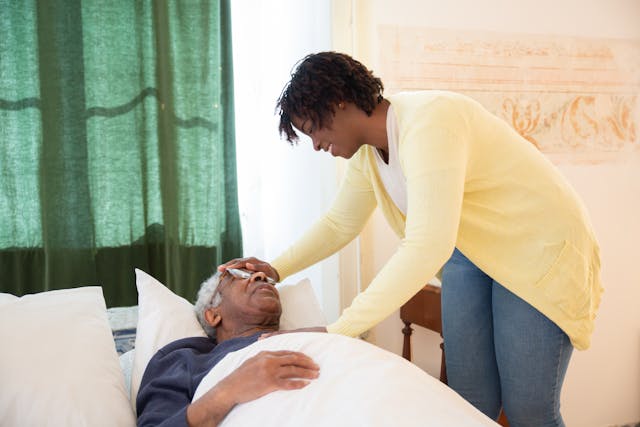About 1 in 3 adults in the United States are caregivers. As the population ages, the demand for new caregivers starts to grow. However, many of them have experienced extreme burnout. Because of this, caregivers must protect their mental health and well-being before helping someone in need. If you’re a caregiver who needs some support, learn how you can recognize the signs when you need it, strategies to protect your mental health, and what mental health resources are out there to benefit you.
Emotional Toll Being a Caregiver Can Take
While being a caregiver for a sick loved one or an elderly person is a rewarding job, it is a stressful one as well. It involves looking after the care, health, and welfare of a person who can’t help themselves. While you would be considered doing a noble thing for someone, being a caregiver is indeed a job that can cause mental, emotional, and physical burnout. If you’re a caregiver, the incessant demands of it all can cause you to become angry, frustrated, overwhelmed, and drained. You also start to feel like you’re alone in caring for this person you do care about. Being a caregiver prevents you from finding some time to take care of your own well-being. By caring for this person who may need constant care and support, the stress that you have could cause mental health conditions such as depression, anxiety, and overwhelming sadness.

Recognizing Signs You Need Mental Health Support
Before deciding to seek mental health support, it’s important to know the signs of caregiver burnout. Being aware of the signs allows you to know what to do about them. If you’re not aware of the mental health-deteriorating signs, you could start to harm yourself soon. Devoting too much of your time and energy to caring for a loved one or a sick, elderly person could permanently wear you out physically, mentally, and emotionally. If you start to feel:
- Signs of constant fatigue.
- Irritability, frustration, or anger toward others.
- Trouble sleeping.
- Changes in your appetite and/or weight.
- Unable to concentrate clearly.
- Distancing yourself from friends and family and
- Always feeling sick, just to name a few, you could be experiencing signs of needing mental health support.
However, there are some practical strategies caregivers can use to protect their mental health. If you’re a hardworking caregiver, here are some ways to avoid the signs of serious burnout.
Strategies to Protect Yourself From Caregiver Burnout
Protecting yourself as a caregiver from serious burnout could be done by utilizing a few strategies. The important one is to prioritize your well-being first. Set aside some time to take some much-needed breaks such as vacations. Be willing to set some boundaries concerning how much work you’re willing to take on. Consider doing some relaxation techniques like breathing exercises. This isn’t being selfish or you all of a sudden don’t care about the sick person. What you’re doing is looking after your overall health and well-being. How are you going to take care of someone else who’s in need when you become sick?
It’s also vital that you seek the right kind of support as a caregiver. This usually comes from family and friends who are willing to pick up the slack in watching the sick or disabled person. When you’re feeling too overwhelmed, you must seek professional help from mental health specialists. Some caregivers also have found joining support groups, online and offline, to be helpful. Professional therapy and counseling are also good ways to help you protect your mental health.
You could also try using time management tools to set aside an hour for yourself. Several apps allow you to better do this such as Google Calendar and Trello. But it’s also perfectly acceptable to use a good old-fashioned calendar book or a simple notebook to help you prioritize what’s important in your life. Another good idea is delegating caregiving responsibilities to others.
Mental Health Resources for Family Caregivers
There are plenty of mental health resources such as hotlines or local organizations that are meant to support overwhelmed caregivers. You could find various online or local networks near you that could provide the support you need to overcome burnout. One good online resource is Family Care Navigator, which helps family caregivers locate public, nonprofit, and private programs and services near their loved ones. Caregivers could locate available services such as government health and disability programs, legal resources, and disease-specific organizations for their loved ones based on the state in which they live.
There are also some unique apps out there designed to support a caregiver’s mental health. I found out about an interesting one called Lotsa Helping Hands. What’s cool about this app is that it facilitates community support for caregivers suffering from burnout. They could easily stay in touch with family, friends, and members of their care team to share messages, schedule tasks, send photos, and make important announcements. You could also create care calendars, coordinate meal deliveries, and schedule appointments for the person in need.
Why All Caregivers Must Protect Their Mental Health
Caregivers protecting their mental health is not only something they have to do. It’s something that they must do. While anyone doing this job should be commended, it’s also a very stressful job that if you’re not careful, could negatively affect your mental, emotional, and physical well-being. That’s why you must take care of yourself first before taking care of someone else. If you follow these various ways to avoid caregiver burnout, you’ll be learning how to protect your mental health against this condition.
Are you an overwhelmed caregiver who needs some support in protecting your mental health and overall well-being? How do you find that support? Feel free to share your thoughts in the comments section below. As always, be sure to like or share this post with the next hardworking caregiver you know.

